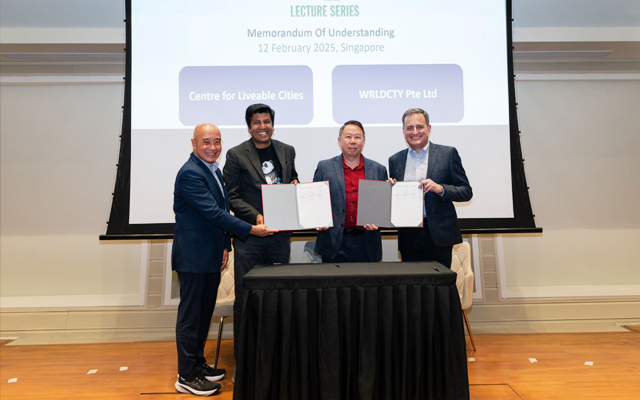
The Centre for Liveable Cities (CLC) and WRLDCTY Pte Ltd have formalised a partnership to collaborate on creating more liveable, lovable, and sustainable cities.
A Memorandum of Understanding (MoU) was signed on February 12, 2025, by Hugh Lim, executive director of CLC, and Christopher Fair and Anupam Yog of WRLDCTY, at a CLC lecture focused on urban liveability.

This marks the first formal agreement between the two organisations and establishes a framework for knowledge exchange and international collaboration. The MoU outlines joint efforts across various platforms, including conferences, symposiums, research projects, studies, and publications. Both CLC and WRLDCTY will leverage their respective networks to foster new global connections.
A key aspect of the partnership will involve collaborating on global conferences and knowledge-sharing events. This includes joint participation in expert panels and the development of complementary sessions and workshops at significant events. Notably, WRLDCTY will bring its global conference to Singapore for the first time, coinciding with CLC’s World Cities Summit in June 2026.
The MOU also emphasises collaborative research into the measurement and design of liveable and sustainable cities and regions. CLC and WRLDCTY plan to co-author knowledge products, such as blogs, articles, and urban briefs, translating research findings into practical steps for implementation.
“CLC and WRLDCTY believe that cities should be liveable, distinctly loveable and sustainable. Through this partnership, we aim to offer greater insights, inspire more innovative approaches and solutions, and leverage on each other’s networks to reach out to more city leaders and urban practitioners around the world…,” said Lim.
Christopher Fair, director of WRLDCTY, added: “CLC and Resonance have both been studying and sharing best practises in sustainable urban development and innovation for more than a decade. This collaboration is not only an opportunity to bring the best minds from both our organisations together on key research initiatives, but to amplify our outreach and knowledge sharing together with countries, cities and communities around the world.”




















